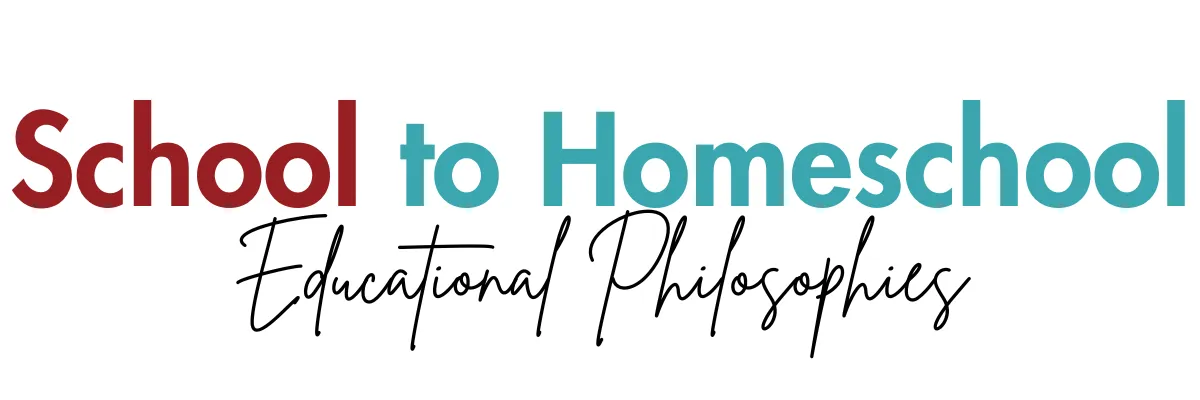
Homeschooling offers a myriad of educational philosophies. While this list is NOT comprehensive, it gives a little taste of the major philosophies.
the best approach for your family is what works best for you...and if it isn't working...you can CHANGE!

Classical education, with roots in ancient Greece and Rome, emphasizes the development of critical thinking, logical reasoning, and a deep understanding of the liberal arts. Here are the key elements of this approach:
Three Stages of Learning: The Trivium divides education into three stages: Grammar (elementary years), Logic (middle school years), and Rhetoric (high school years). Each stage focuses on skills appropriate for the child’s cognitive development.
Language-Centered Education: Emphasizes language skills, often including Latin and Greek, to help students understand the roots of English and other modern languages.
Great Books and Classical Literature: Involves reading and analyzing classic literature and significant works of Western civilization to develop critical thinking and a deep understanding of human nature.
Logic and Reasoning: Focuses on formal logic, argumentation, and independent thinking during the Logic stage.
Integrated Subjects: Promotes an interconnected approach to learning, integrating subjects like history, literature, and art.
Memorization and Recitation: Utilizes memorization and recitation to aid learning and retention.
Socratic Method and Discussion: Uses thought-provoking questions to stimulate critical thinking and dialogue.
Cultivation of Virtues: Aims to develop virtues and character through the study of classical literature and philosophy.

The Unit Studies method integrates multiple subjects around a specific theme, encouraging interdisciplinary learning and a holistic understanding of the topic. Key principles include:
Thematic Approach: Centers around a broad or specific theme, such as "Marine Biology" or "Civil War."
Integration of Subjects: Combines subjects like history, science, language arts, and math into the chosen theme.
Flexibility and Customization: Allows for curriculum adaptation to suit the child’s interests and learning style.
Hands-on and Experiential Learning: Includes activities, experiments, and real-world experiences to enhance learning.
Cross-Curricular Connections: Encourages connections between different subjects for a comprehensive understanding.
In-depth Exploration: Allows for deep dives into topics, promoting research and critical thinking.
Project-Based Learning: Involves long-term projects related to the theme.
Individualized Learning: Adapts the curriculum to meet each child’s unique needs.
Integration of Life Skills: Incorporates practical life skills into the curriculum.
Parental Involvement: Requires active parental participation in planning and guiding the learning process.

Developed by British educator Charlotte Mason, this approach emphasizes a broad and liberal education that nurtures the whole child. Key elements include:
Living Books: Uses high-quality literature written by passionate authors to engage and educate.
Narration, Dictation, Copywork: Encourages students to orally or in writing recount what they have learned; copy words, sentences, and paragraphs from good books.
Short Lessons: Focuses on short, concentrated lessons to maintain attention.
Nature Study: Promotes outdoor observation and interaction with nature.
Habit Formation: Emphasizes the development of good habits and character.
Art and Music Appreciation: Includes study and appreciation of various artistic and musical works.
Foreign Language Study: Encourages early exposure to foreign languages through immersion.
Avoidance of Twaddle: Rejects shallow, oversimplified educational materials.
Outdoor Play and Physical Education: Values physical activity and outdoor play.
Parental Involvement and Atmosphere: Stresses the importance of a supportive and nurturing home environment.

Founded by Rudolf Steiner, Waldorf education emphasizes holistic and artistic learning, nurturing the child's mind, body, and spirit. Key principles include:
Holistic Education: Focuses on intellectual, emotional, physical, and spiritual development.
Age-Appropriate Curriculum: Aligns content with the child’s developmental stages.
Rhythm and Routine: Emphasizes a structured daily rhythm.
Imaginative and Play-Based Learning: Values imaginative play and storytelling in early childhood.
Main Lesson Blocks: Explores subjects in depth during multi-week blocks.
Artistic Expression: Integrates art, music, and drama into the curriculum.
Nature and Outdoor Education: Encourages connection with nature through outdoor activities.
No Early Academics: Delays formal academics until after age seven.
Limited Use of Technology: Minimizes screen time and electronic device usage.
Teacher as a Guide: Teachers observe and support individual learning needs.

Developed by Maria Montessori, this approach emphasizes hands-on learning, independence, and respect for the child’s natural development. Key principles include:
Prepared Environment: Organizes a learning space that promotes independence and exploration.
Mixed-Age Grouping: Encourages learning and interaction among different age groups.
Hands-On Learning Materials: Uses specialized materials to promote self-correcting exploration.
Self-Directed Learning: Allows children to choose their activities and work at their own pace.
Individualized Instruction: Observes and supports each child’s unique learning needs.
Practical Life Skills: Teaches everyday skills to promote independence.
Sensorial Exploration: Provides sensory-rich materials to develop cognitive skills.
Respect for the Child: Values each child’s dignity and choices.
Focus on Independence: Encourages responsibility for one’s own learning.
Peace Education: Promotes empathy, conflict resolution, and global citizenship.

Unschooling emphasizes child-led learning and autonomy, based on the belief that children learn best when pursuing their own interests. Key principles include:
Child-Led Learning: Allows children to determine what, when, and how they learn.
Individualized Education: Tailors learning to each child’s interests and pace.
Freedom and Autonomy: Values the child’s freedom to make learning choices.
Real-Life Experiences: Encourages hands-on activities and practical experiences.
Learning Through Play: Recognizes play as a fundamental aspect of learning.
Flexible Schedule: Adapts learning to the child’s natural rhythms.
Trust in Natural Learning: Believes children are naturally curious and motivated to learn.
Learning in Context: Acquires knowledge as it becomes relevant.
Self-Evaluation and Reflection: Promotes self-assessment and goal-setting.
Lifelong Learning: Fosters a passion for lifelong learning and personal growth.

Eclectic homeschooling combines elements from various educational philosophies to create a personalized learning experience. Key aspects include:
Customized Curriculum: Selects materials from different sources to suit the child’s needs.
Individualized Instruction: Adapts teaching methods to the child’s strengths and interests.
Flexibility and Freedom: Allows for flexible scheduling and pacing.
Integration of Multiple Approaches: Combines elements from various educational philosophies.
Emphasis on Real-Life Experiences: Incorporates practical skills and real-world contexts.
Child-Led Learning: Follows the child’s interests and passions.
Assessment and Evaluation: Uses diverse assessment methods to gauge progress.
Resourcefulness and Adaptability: Requires parents to be resourceful and adaptable.

Forest school is an educational approach that takes place in a natural environment, emphasizing child-led learning and holistic development. Originating in Scandinavia, forest school principles are grounded in fostering a deep connection with nature while supporting various aspects of development, including physical, emotional, social, and cognitive skills. Here are some key elements and philosophies of forest school:
Child-Centered Learning: Emphasizes the interests and needs of the child, allowing them to guide their learning experiences.
Play-Based Learning: Play is seen as a crucial element of learning, with children encouraged to engage in imaginative and creative play.
Nature Connection: Cultivates a sense of stewardship and appreciation for the natural world, promoting environmental sustainability and awareness.
Resilience and Independence: Encourages children to take risks, solve problems, and develop confidence and self reliance
Social and Emotional Development: Fosters positive social interactions, teamwork, and emotional well-being through collaborative activities and a supportive community.
Experiential Learning: Learning through direct experience and interaction with the environment, promoting practical skills and a deeper understanding of concepts.

A Thomas Jefferson Education (TJEd), also known as Leadership Education, is a homeschooling model that emphasizes the cultivation of self-education and leadership skills. It draws inspiration from the educational practices of Thomas Jefferson and other Founding Fathers of the United States. Here are the key elements and philosophy behind the TJEd model:
Classics-Based Learning: TJEd emphasizes the study of classic literature, original historical documents, and great works in various fields. The idea is that these works contain timeless principles and insights that can help develop critical thinking, moral integrity, and leadership skills.
Mentorship Over Traditional Teaching: Instead of the traditional teacher-student dynamic, TJEd promotes mentorship. Parents and educators act as mentors, guiding students in their learning journey and helping them develop their interests and talents.
Three Phases of Learning:
-Core Phase (ages 0-8): Focuses on the development of good habits, character, and a love of learning through play, chores, and simple lessons.
-Love of Learning Phase (ages 8-12): Encourages exploration and curiosity, with students pursuing subjects that interest them in a less structured way.
-Scholar Phase (ages 12-18): Students engage in more rigorous academic study, often focusing on reading, writing, and discussion of classic works, with the guidance of mentors.
Seven Keys of Great Teaching:
-Classics, Not Textbooks: Emphasis on primary sources and classic works.
-Mentors, Not Professors: Guidance through mentorship rather than traditional instruction.
-Inspire, Not Require: Encouraging a love of learning by inspiring students rather than mandating studies.
-Structure Time, Not Content: Providing a structured schedule but allowing flexibility in what is studied.
-Quality, Not Conformity: Focusing on deep understanding and quality work over standardized measures.
-Simplicity, Not Complexity: Keeping education straightforward and avoiding unnecessary complexity.
-You, Not Them: Encouraging parents and mentors to pursue their own learning and personal growth to set an example for students.
Emphasis on Leadership and Citizenship: TJEd aims to develop individuals who are not only knowledgeable but also capable of thinking critically and leading effectively in their communities and beyond.

School at Home (and what many people “think” homeschooling is…in my opinion, the least effective…why mimic a failing system???…just my two cents!)
The "school-at-home" homeschooling philosophy is a structured and traditional approach to homeschooling that closely mimics the conventional school environment and curriculum. Here are some key characteristics of this method:
Structured Schedule: School-at-home often follows a fixed daily schedule similar to that of a traditional school. This includes set times for subjects, breaks, and extracurricular activities.
Standardized Curriculum: This approach frequently uses a pre-packaged curriculum that mirrors what is taught in public or private schools. Many families use textbooks, workbooks, and other materials designed for classroom use.
Formal Assessments: Regular testing and assessments are common in the school-at-home method. Parents often administer quizzes, tests, and standardized exams to track their child's progress and ensure they meet educational standards.
Defined Learning Environment: A specific area in the home is typically designated as the "classroom." This space is equipped with desks, whiteboards, and other traditional school supplies to create a formal learning environment.
Teacher-Led Instruction: Parents take on the role of teachers, providing direct instruction and guiding their child's learning. This can include lectures, demonstrations, and supervised practice.
Grade Levels and Subjects: Students progress through grade levels in a manner similar to traditional schools. The curriculum covers standard subjects such as math, science, language arts, social studies, and often includes additional subjects like foreign languages, art, and physical education.
Homework and Assignments: Just like in conventional schools, students may have homework and assignments to complete outside of "school hours."
Use of Technology: Many school-at-home programs incorporate online resources and virtual learning tools, especially for subjects where parents may not feel confident teaching.
Regulatory Compliance: Families who choose the school-at-home approach often ensure their homeschooling practices align with state or local PUBLIC educational requirements, including record-keeping, reporting, and abiding state public school standards.
Parental Involvement: While parents are heavily involved in the teaching process, they may also seek external support, such as online courses, tutors, or co-op classes, to supplement their child's education.
